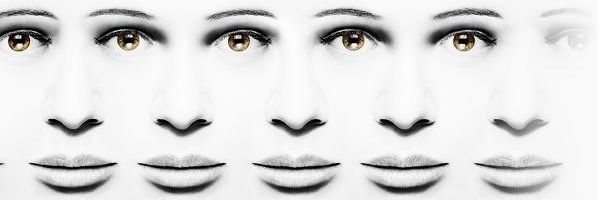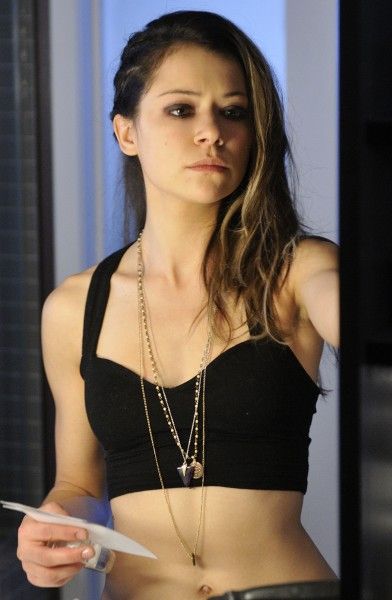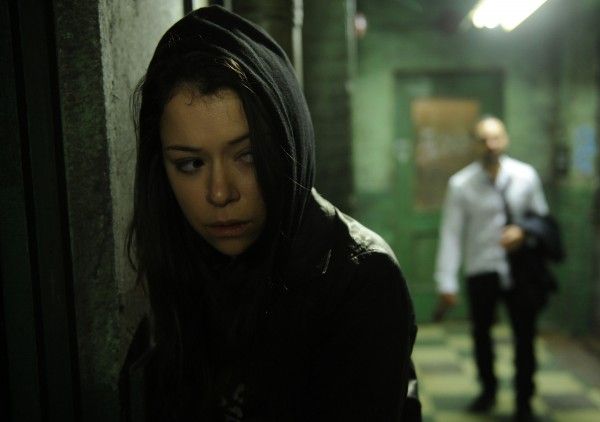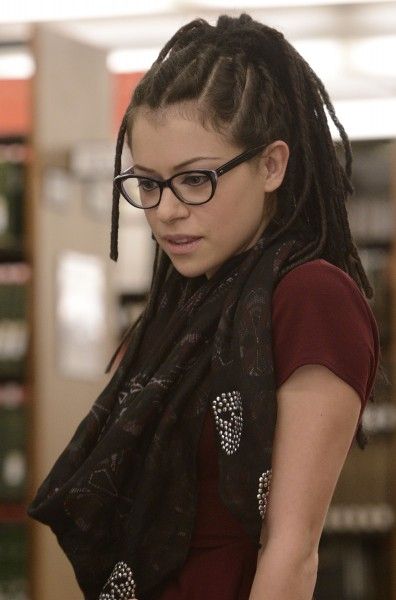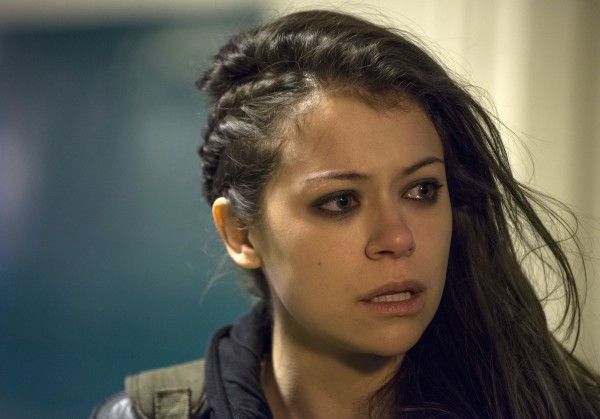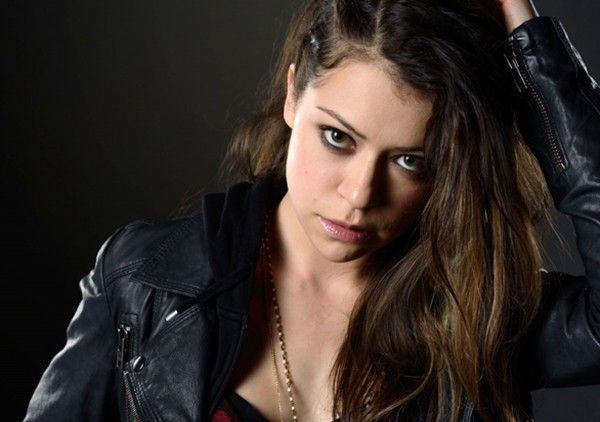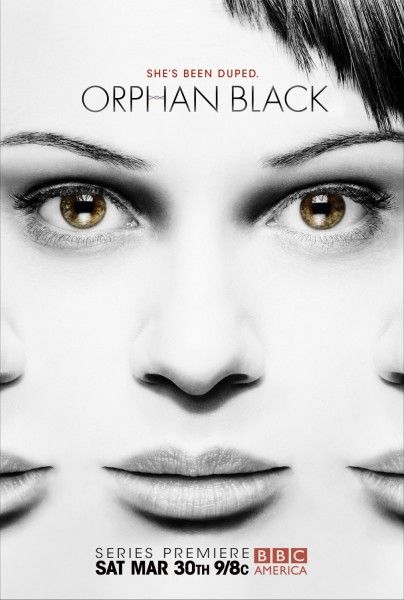The new BBC America drama series Orphan Black tells the story of Sarah (Tatiana Maslany), a young woman whose life changes dramatically after witnessing the suicide of a woman who looks just like her. She hopes that cleaning out the dead woman’s bank account will solve all of her problems, but quickly finds herself caught up in the middle of a mysterious and deadly conspiracy.
During this recent interview, show co-creator/executive producer/writer/director John Fawcett talked about the type of storylines they’ll be exploring this season, whether there could be other sets of clones, what it was about show star Tatiana Maslany that made her the perfect actress to carry so many characters, the technical challenges of shooting scenes with the clones, major inspirations for the show, telling a serialized story, deciding what to reveal and when, and the bigger plan for the series. Check out what he had to say after the jump, and be aware that there are some spoilers.
Question: What can you say about the type of storylines you’ll be exploring this season?
JOHN FAWCETT: Orphan Black is basically a mystery thriller with a sci-fi angle. Of course, the big question is, “Who am I?” That’s the overarching mystery of the series. And because of the mystery-thriller aspect of the show, the deeper you go into the rabbit hole the more questions you get. You get answers along the way, but more questions start to arise. That is the biggest storyline that we're following, through the course of the series. I don’t think it’s a spoiler to say that there may be some more clones. Those characters have their own storylines, and contribute to the larger picture and the larger mystery.
If Sarah’s DNA is being used for these clones, might there be other DNA templates for other sets of clones that may show up throughout the series?
FAWCETT: Well, we don’t know if Sarah is the original or not. We don’t know where this DNA is from. That is one of the mysteries for us. As Sarah discovers she’s a clone, it really is a story of, “Who am I and where did I come from?” And it is an identity thriller, in some sense, with that feeling of, “I thought I knew who I was and suddenly my world is upside down. There are copies of me, so am I the original? And if I’m not the original, who is?” I think that’s a really fantastic and massively bewildering dilemma to put a character in. We throw Sarah down this rabbit hole, which is Orphan Black. Beyond that, my creative partner and co-creator Graeme Manson and I have had many discussions about where the show will ultimately go and what will occur, in further seasons. I wouldn’t want to rule out the possibility of other clones, but I can’t say exactly that, at this point. I think we’re all very fascinated with Sarah, and we’re fascinated with her clone sisters and their journey. We’re hoping that people will find that journey as attractive and as exciting as we do.
Where did you find Tatiana Maslany?
FAWCETT: Well, Tatiana and I had actually crossed paths many, many years earlier. I created a feature film called Ginger Snaps. We made two sequels to it that I executive produced, and we were casting this really cool, young, spooky girl part in the sequel, and that’s when I came across Tatiana. The funny thing is that, when I was casting that part, there were two people up for it -- Tatiana versus Ellen Page -- and I went for Tatiana. So, she and I were aware of each other and knew each other and had worked together, previously, so I was well aware of the girl’s mad skills. And we get along great. We were just lucky to have such a great collaboration between us.
What’s it like to shoot scenes with the clones interacting together?
FAWCETT: Episode 3 is the first time we get three girls in one room talking, and that was done by a director named David Frazee. It’s extremely complicated, and we had some rehearsal ahead of time. We block out the scene like a regular scene, except it’s Tat and her acting double, and then another acting double because there were three of them in the same room. And the scenes get shot in layers, so it’s a very time consuming process. It’s a head scratcher for the director and for Tatiana because it’s really about working out all the details of each of the characters. Rehearsal time is helpful because at least Tat has the time to play each of the parts and figure out exactly what she wants to do physically and how she would respond. As we went deeper into the season, time became a little bit more of a premium, so it became a little more complicated, but we got better at it, as we went along. But, it’s very time consuming.
Was the decision to make Sarah a working class Londoner done with the idea that it would appeal more to people in the UK?
FAWCETT: We wanted a show that we could shoot in North America. As we were looking for partners, we started getting a lot of love from BBC America, who were really into the project, which was exciting to us. But, being BBC America, they want to hear a little bit of British. So, it was an interesting creative conversation to have because they asked us, up front, “Can the lead character speak with a British accent?” I had never thought of that. That had never occurred to me before. In our original version of the story, Sarah was not British. But, the more I thought about that, the more I realized that, in fact, was a really cool thing for the character. Really, one of the main reasons was to differentiate her from everyone else. I worried a little bit about the audience being able to follow who was who. If Sarah speaks with a British accent and she steps into the role of Beth, and Beth is American, then it would be really cool to see this British accent turn into an American accent. I thought that that was just a neat way to watch her become Beth, and a nice way to differentiate Sarah from everyone else. Plus, it opened up the world of the clones and suddenly became a much bigger story. Potentially, there are clones in Germany, there are clones in Europe, there are clones in North America. This isn’t all just happening in our backyard, conveniently. I think that that’s good for the overarching mystery of the show.
Sarah is trying so hard to hold on to her own life, while pretending to be Beth. How hard is it going to be for her to keep it all together?
FAWCETT: That’s part of the excitement of the show, really. One of the things that I liked so much about the story was watching somebody thrust into someone else’s life, having to make it up as they go along and respond in the moment, trying to keep all the lives straight and trying to charade her way through this life that she really knows nothing about. And then, she suddenly comes to the realization that the life that she’s inhabiting and trying to fake her way through turns out to be that of a cop. That just ups the stakes and makes the level of her lies and the volume of this act that she’s having to put on just go way up. It’s exciting to watch. I love watching all the close calls to see how she’s going to get out of this and if she’s going to get busted. Watching her worm her way out of various situations is part of the excitement of the show. Hopefully, it’s one of the big aspects to the series that will keep the viewers coming back, episode after episode.
What has the fan reaction been like, so far?
FAWCETT: I’m a massive sci-fi fan to begin with and I had a lot of belief in just being a fan of the genre myself. This was a concept we had over 10 years ago. The idea for the show was born back in 2002 or 2003, and it started as a feature film. Graeme Manson, my creative partner, and I worked on it together for a number of years, but couldn’t solve it as a feature film, so we shelved it for two or three years. But, every time we get together, we’d wind up having drinks and talking about the concept of it. It just never went away and never died. I have a very short attention span, so for a concept like this to stick around, for years and years, and every time that we’d talk about it, we’d get excited about it, I just knew that there was something special in that. I see an awful lot of sci-fi, and I just knew, in my heart, that I had this passion about it because it was unique and original and exciting. I just thought, “There’s going to be a lot of people that are really going to dig this.” I’m hoping that sci-fi fans find the show and find it as exciting as I do.
When you were conceiving the idea of Orphan Black, what were some of the major inspirations?
FAWCETT: At the time, I had just seen Memento, but that was a long time ago. It was about a character who was confused and flying by the seat of their pants, and in a mystery that was unraveling almost in real time, and the audience was in that mystery and seeing that mystery from the point of view of the main character, not ahead of the main character. So, I know Memento was definitely an inspiration. Other than the serialized sci-fi mystery aspect to this, the thing that I was most excited about was the idea of there being multiple versions of this woman. I got very excited about seeing a show, and being able to be a part of a show, where we could create all these different characters. It’s one of the most challenging, difficult aspects to the series, but it’s also one of the most exciting parts. Every time there are scenes with the clones, where Tatiana is playing multiple versions of herself, they’re always the scenes that you’re so fascinated by and drawn to. And it’s a massive part of what got me excited about the concept, in the first place.
Did you always want Orphan Black to be serialized?
FAWCETT: Yes, it was absolutely part of the show. The show began life as a feature film. We couldn’t solve it in a 2 ½ hour format, and that’s why it sat on the shelf for awhile until Graeme came back to me and said, “Maybe we could solve this problem, if this was a TV series rather than a feature film.” And at that point in my life, I had always thought of myself as a filmmaker. But, around 2007 or 2008, as we picked it back up and started to develop it as a series, I had been watching more television than feature films, and every stitch of television that I was watching was serialized cable shows, other than Lost. I was a huge fan of Battlestar Galactica, which was a serialized show. Six Feet Under had this great sense of comedy and a very dark sense of humor, which I really gravitated towards. I loved the idea that, because this was a mystery, each episode was a new chapter in a bigger story, much in the way Lost functioned. One of the difficulties in creating a show with such a complex, huge story is actually selling it. We had a very difficult time getting Orphan Black made because nobody wanted to make a serialized show. BBC America was honestly the first network that came to us and said, “Not only do we love your show, we would make a serialized show with you. We want you to make the show you want to make.” It was their love and belief in Orphan Black that allowed the show to become a reality.
How do you decide what to reveal and when?
FAWCETT: Well, there’s obviously the big picture of the series with the major questions of, “Who am I? Where do I come from?” There are the larger identity questions in the show. Then, there’s the season mystery, which is a little bit smaller. Sarah has catapulted into this world, and this rabbit hole opens up for her. It really does truly become, “Do I take the red pill or the blue pill? Do I walk away from this now and just try to ignore it, or do I take the money and run?” There are so many mysteries. All those questions change and morph, throughout the course of the series. The more answers we get, the more we go seeking. As we get some answers, we get a whole bunch more questions. That’s the thrill ride of this show.
Do you have a five-year plan for the show?
FAWCETT: Well, we knew what we wanted to do with Season 1, and we more or less really know what we want to with Season 2, if we have the opportunity to do a Season 2. Beyond that, we have the bigger picture and the end game. It’s interesting creating a show like this because, as much as I want to say no, we know exactly what we’re doing. As you get into the show and you start to shoot it, things change. You hire a guest cast that comes in and you go, “Wow, they’re really great! I want to do more with them.” As we were coming up on Episode 10, Graeme would say, “Do you really want to do that? Isn’t that painting us into a bit of a corner?” I find it creatively exciting to try to figure out how the hell to get out. I actually like the thrill of not knowing, to some degree, and I think that that’s what the audience wants to see, too. They want to go, “What the hell?! How is he going to solve this? How are they going to get themselves out of that? How is Sarah going to get through this and not get busted?” It’s something that I love to watch. I hope the show just continually keeps pulling the rug out from under the viewers’ feet.
Orphan Black airs on Saturday nights on BBC America.

